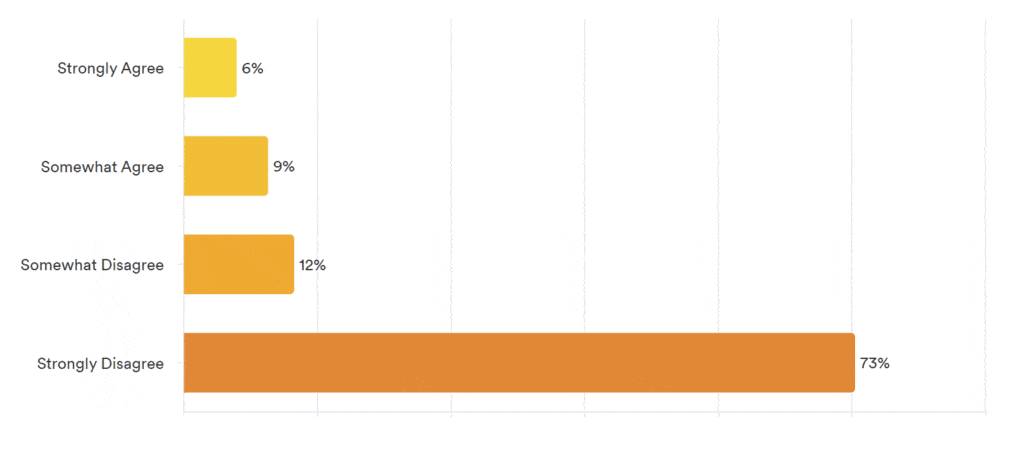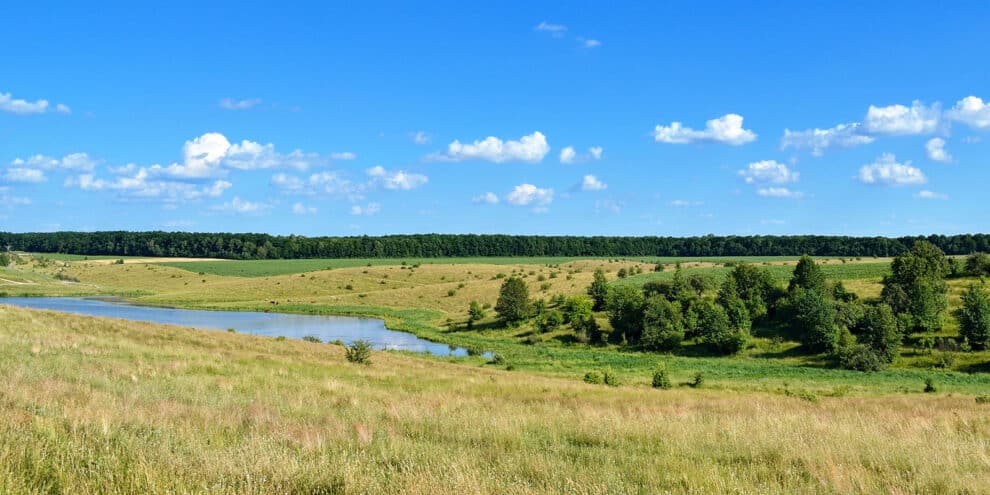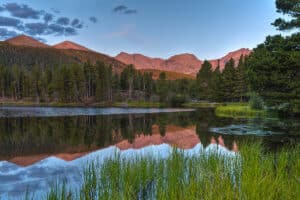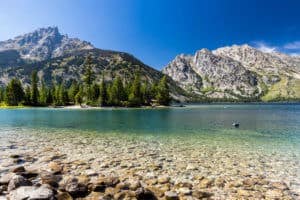Last month, the LANDTHINK Pulse posed the following question to our audience: Do you agree with government regulating or restricting the use(s) of water on private land?
Anyway you look at it, government intrusion and ever-increasing federal regulations have the majority of Americans seeing red. For decades, Waters of the United States (WOTUS) rules and water rights have been a subject of regulatory and legal ping-pong, leaving farmers, ranchers and rural landowners caught in the middle of navigating the consequences of these changes while feeding a growing global population. The rule defines which “waters of the United States” are protected by the Clean Water Act (CWA). Our informal online survey revealed that 73% of respondents believe that it’s time to rein in the government regulatory overreach on our land, water and air.

For decades, the Environmental Protection Agency (EPA) and the U.S. Army Corps of Engineers (Corps) have tried to define WOTUS in a vague and overbroad manner, covering almost every water imaginable, and even what most people would consider to be dry land. For decades, the term used to define millions of acres of water and land features including ponds, farms, and backyards has been a flashpoint between environmental groups and farmers, ranchers, builders and industry groups. The WOTUS definition is critical because it informs what waters can be regulated under the CWA. The never-ending regulatory uncertainty has put farmers and ranchers in a position where they will have to hire lawyers and consultants to figure out whether they need permits for the most basic upgrades and investments to their land, as well as possibly face severe penalties if incorrect. Recent lawsuits claim the regulations have the potential to negatively impact landowners, farm families, municipalities, and small businesses all across our great country.
In 2022, the Biden’s Administration finalized regulations that protected hundreds of thousands of small streams, wetlands and other waterways, repealing a Trump-era rule. The Biden Administration’s definition of “waters of the United States” (2023 Rule) comes after definitions adopted by the Obama Administration in 2015 (the 2015 Clean Water Rule) and the Trump Administration in 2020 (the Navigable Waters Protection Rule). The 2015 Clean Water Rule was formally repealed under the Trump Administration on September 12, 2019; the administration then published the Navigable Waters Protection Rule providing a new definition of “waters of the United States” on April 21, 2020. The Trump administration’s WOTUS rule provided much needed clarity and predictability to regulated parties across the United States. And despite what some claim, the Trump-era rule did not give polluters free rein to disregard the health of our nation’s waterways.
On Aug. 29, 2023, the Biden administration issued a prepublication version of yet another final CWA rule (“Conforming Rule”) revising the definition of WOTUS in response to the U.S. Supreme Court’s decision in Sackett v. EPA, published May 25, 2023.
The Sackett v. EPA case began in 2007. The plaintiffs, Chantell and Michael Sackett, were building a new home in Priest Lake, Idaho, when the EPA and Army Corps of Engineers officials informed them their residential lot was on a protected wetland. The Sacketts argued that their private land in Idaho does not fall under the regulatory scope of EPA. But the agency had informed the Sacketts that the couple would be fined for developing their property because the land contains wetlands that are protected under the definition of WOTUS in the Clean Water Act.
The Sacketts sued the government after facing numerous threats of fines. The U.S. Supreme Court ruled in favor of the Sacketts, stating that the EPA’s interpretation of wetlands was inconsistent with the text of the Clean Water Act.
Justice Samuel Alito wrote the majority opinion on May 25, 2023, expressing that the court held that this definition was too broad, and limited EPA’s authority to only wetlands “with a continuous surface connection” to navigable waterways. Nine Justices agreed that the Sackett’s land should not have been subject to EPA authority. The ruling was highly celebrated in the agriculture industry.
As the Sackett v. EPA was being decided, a group of 17 organizations challenged the new Waters of the U.S. (WOTUS) definition through a lawsuit against the EPA. Agricultural plaintiffs include the National Catttlemen’s Beef Association, National Pork Producers, National Corn Growers Association, the U.S. Poultry and Egg Association, Texas Farm Bureau and the Matagorda County Farm Bureau in Texas. Other plaintiffs included the American Petroleum Institute, the National Association of Home Builders and the National Association of Realtors. The suit, filed Jan. 18 in a U.S. District Court in Texas, argues that the law is overly broad and that “the rule imposes impossible—and unpredictable—burdens on landowners.” In this lawsuit, they emphasized the importance of clear water regulatory guidelines to protect our nation’s food security.
Although the WOTUS rule provides exemptions for certain croplands and water features commonly found on farms, such as irrigation districts or stock ponds, farm groups earlier argued that the law could allow the government to regulate almost any low spot on a farmer’s field where water gathers. The suit said the rule would interfere with normal business activities and subject unknowing property owners to criminal and civil penalties.
Now in 2024, Idaho ranchers are fighting the Feds for water. Ranchers are fighting back against a federal government push to confiscate vital water rights for livestock, thereby endangering the care and production of cattle. Current state law provides for individuals to acquire rights to public waters by granting permission to use them for beneficial purposes such as watering livestock. Now, our federal government is attempting to declare that state law unconstitutional. By nullifying the law, the U.S. government would jeopardize ranchers’ rights to provide life-sustaining water to livestock, as they have for decades. Beyond Idaho’s borders, water users in other states are closely monitoring developments, apprehensive about the potential impact on their own rights.
American farmers and ranchers are among our nation’s first and finest conservationists. They understand better than anyone that clean water, clear air and healthy soil provide important functions to ecosystems and agricultural uses that cannot be understated. They have made incredible strides to protect the land they rely on. As the results of last month’s Pulse show, many are concerned about government overreach with the potential to limit food production, American energy production, home building, and critical infrastructure projects. Farm families are the original stewards of our land, their livelihoods depend upon clean water. The Federal government adding more cost to food production in the form of unnecessary regulation is a bad idea, but it is especially bad to do so during a time of rising inflation, rising input costs, and rising food prices.
Do you have a suggestion for next month’s Pulse question? Submit your question and we might choose yours!
This content may not be used or reproduced in any manner whatsoever, in part or in whole, without written permission of LANDTHINK. Use of this content without permission is a violation of federal copyright law. The articles, posts, comments, opinions and information provided by LANDTHINK are for informational and research purposes only and DOES NOT substitute or coincide with the advice of an attorney, accountant, real estate broker or any other licensed real estate professional. LANDTHINK strongly advises visitors and readers to seek their own professional guidance and advice related to buying, investing in or selling real estate.










The govenment has no right to control private water unless there is proof of unhealthy chemicals being added that affect the health of a community. And then and only then should they get involved if so petitioned by the surrounding community that has exhausted all of the means of having the problem rectified. The water on private property is counted into the size of the property owner and therefore is already being taxed as such. Farmers are again taxed on the sale of their crops or cattle. I think the government needs to concentrate their efforts elsewhere; like making the United States self-sufficient and not rely on other countries for food products that we can produce here. Not just by our larger farmers and ranchers but by families that have taken that approach.